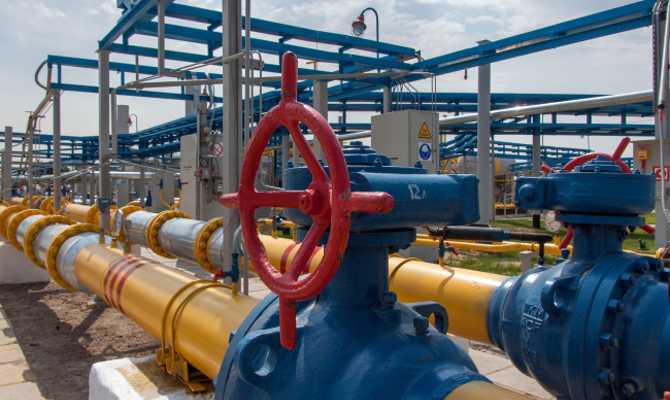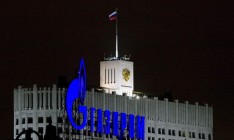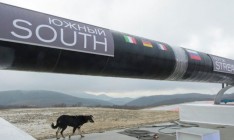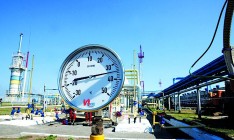Economy
threatsWhile Russia threatens to abandon Ukraine’s gas transport system (GTS), it will have a hard time doing so

Russia’s Gazprom is pushing through the idea of implementation of the South Stream, refuses to take part in the modernization of Ukraine’s GTS and predicts that after construction of the South Stream there will be no need for it. Despite such threats, Ukraine’s underground gas storage facilities (UGSF) are indispensable for the stable supply of Russian gas to Europe.
Ultimate rejection
Gazprom will not take part in the modernization of Ukraine’s GTS, CEO of Gazprom Alexei Miller said last week. “Gazprom’s position regarding the modernization of Ukraine’s GTS is simple – that ship has sailed away long ago”. We will not take any part in the modernization of Ukrainian GTS,” he said. Miller made his statement on the same day Ukraine signed the economic part of the Association Agreement with the EU.
Less than two weeks ago, the standpoint of the Russian authorities was different. In particular, the official spokesman for the Russian Foreign Ministry Alexander Lukashevich stated that the future of the Ukrainian GTS cannot be decided without Russia's participation by definition. Now, the rhetoric of the Russian gas monopoly has changed. Representatives of Gazprom have definitely refused to take part in modernization and promised that soon there will simply be no need in Ukraine’s GTS for the transportation of gas to Europe. “We will have no need for Ukraine’s GTS after we commission the South Stream and the Nord Stream projects and other transport routes,” said Deputy Chairman of the Board of Executive Directors of Gazprom Alexander Medvedev.
A different angle
Russia has been appealing to the South Stream as another route, which will take over transit volumes from Ukraine for a while. Last week, Gazprom repeatedly stated that the next stage of the project, estimated at EUR 56 bn, has been completed. On June 24, Gazprom and the OMV oil and gas company (Austria) signed an agreement on construction of a section of the pipeline on the territory of Austria.
It is expected that the Austrian part of South Stream with the end point in Baumgarten will have a throughput capacity of up to 32 bn cu m per year and will reach its full capacity by 2018. At the same time, Russian authorities have already signed government agreements on construction of the pipeline with Bulgaria, Serbia, Hungary, Greece, Slovenia, Austria and Croatia and assure there will be no obstacles to the implementation of the plan.
No bypass
President of the Center for Global Studies Strategy-XXI Mykhailo Honchar believes that signing of the agreement between Gazprom and OMV on June 24 has practically no meaning for the project. “The Austrian stretch of South Stream is only 50 km long and it does not accelerate the project itself,” said the expert. He added that the key in this project is not Austria but Bulgaria, from which the EU and the U.S. demand compliance to European law in executing the project. “The EU is not against South Stream, but wants it to operate in compliance with the European law, which is not completely satisfactory for Russia, as this means the pipeline will operate at only half of its capacity,” said Gonchar. That is why Gazprom seeks to make South Stream an exception to the European legislation.
He reminded that Russia has long promised to exclude Ukraine from the transit of Russian gas to Europe, but every time it failed to fulfill its promises: “The late Rem Viakhirev used to say: “We will build Yamal – Europe and cut Ukraine out. They built it, but have not abandoned the services of our country. Then they threatened us to build the Blue Stream and cut Ukraine out. They built it as well, but have never cut Ukraine out. Then they said: we will build the Nord Stream and will definitely exclude Ukraine from transit. They built it. Did they cut us out? No, they did not.”
The technical capabilities of the operator of Ukraine’s GTS – Ukrtransgas – allow for annual transport of 140 bn cubic m of gas to Europe. Yet the GTS has been working at nearly half of its capacity for many years: while in 2013 Gazprom pumped through Ukraine 86 bn cubic m of gas, this year the target amount is close to 70 bn cubic m. The expected throughput capacity of South Stream is 63 bn cubic m per year and, theoretically, it could take over the entire amount of gas pumped through the Ukrainian system. Yet according to EU requirements, Gazprom may use only 50% of the capacity of the pipeline and the remaining 50% should be provided to other transporters. The same is the situation with Nord Stream – its capacity is 55 bn cubic m, but Gazprom is allowed to use only half of this volume.
Honchar stressed that after the construction of South Stream Gazprom will have a surplus of transit facilities, but none of the alternative routes boast such UGSF as Ukraine’s GTS. “Without UGSF these routes will be high-risk. When they say “We will turn transit off” or “Ukraine’s GTSS is an outdated piece of junk metal”, it is nothing but bravado. Our GTS is a gas accumulator, which allows the system to function continuously just at the peak of demands in the cold winter,” explained the expert.
Gazprom’s CEO confirmed such a statement. Last Friday, he told reporters that in order to minimize the risks of gas transit through Ukraine the company has already begun creating reserves in the European UGSF and will be able to pump more than 5 bn cubic m of gas into them. Moreover, Gazprom also considers the possibility of further expansion of reserves. At the same time, Miller admitted that the creation of gas reserves in Europe will not mitigate transit risks next winter.

Naftogaz suing Gazprom for $6.2 billion for transit reduction, adaptation of contract to EU terms
20251
The shutdown of South Stream did not increase Ukraine’s chances for attracting investors to the country’s Gas Transport System
79621
Ukraine to take out two loans for the reconstruction of GTS
1 106152

Украине не удастся спрыгнуть с «газовой иглы» России . )
Попытка Украины обойтись без российского газа провалится в самое ближайшее время. Министр энергетики РФ полагает, что украинцы не смогут в полной мере подготовиться к предстоящему отопительному сезону, если не закупят топливо у поставщиков из России, сообщает новостное агентство «Харьков».Что касается будущего сотрудничества Киева и Москвы по газовому вопросу, тут все будет зависеть от заявленных потребностей Украины. Весной и летом страна не нуждается в значительных объемах импортируемого газа. Однако пока температура остается довольно низкой, что требует забора дополнительных ресурсов из подземных хранилищ.)



 of the agreement of syndication with Financial Times Limited are strictly prohibited. Use of materials which refers to France-Presse, Reuters, Interfax-Ukraine, Ukrainian News, UNIAN agencies is strictly prohibited. Materials marked
of the agreement of syndication with Financial Times Limited are strictly prohibited. Use of materials which refers to France-Presse, Reuters, Interfax-Ukraine, Ukrainian News, UNIAN agencies is strictly prohibited. Materials marked  are published as advertisements.
are published as advertisements.